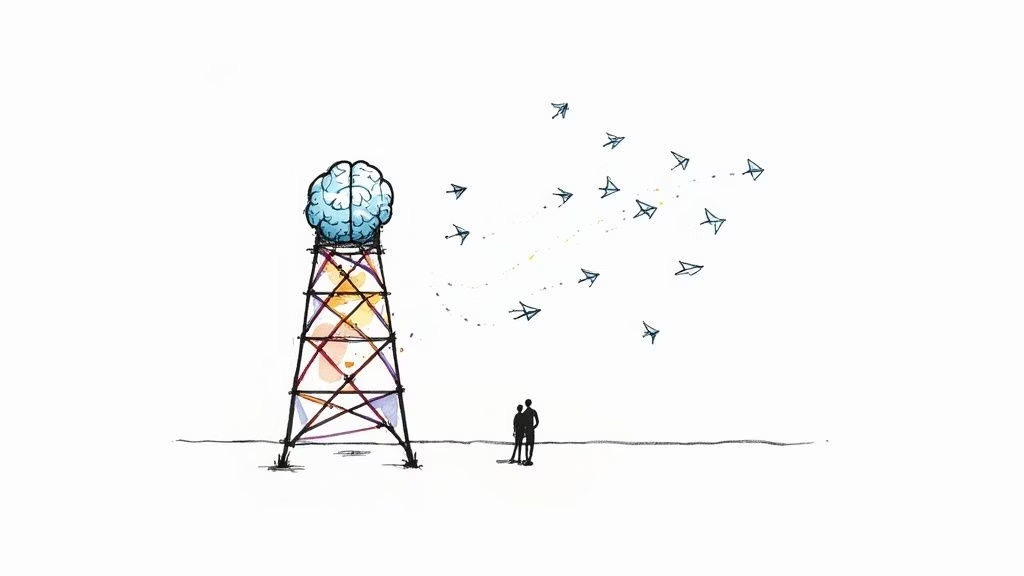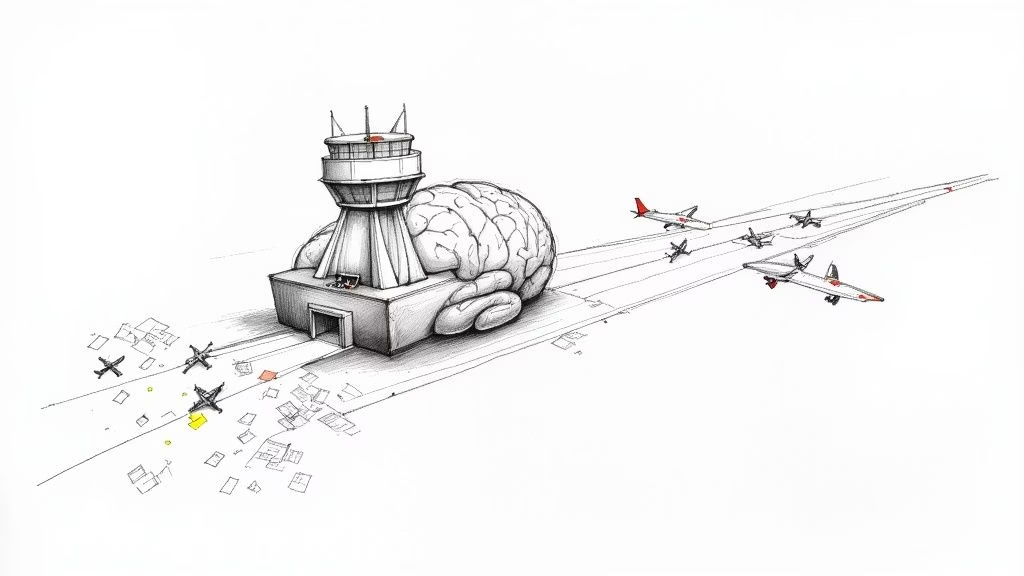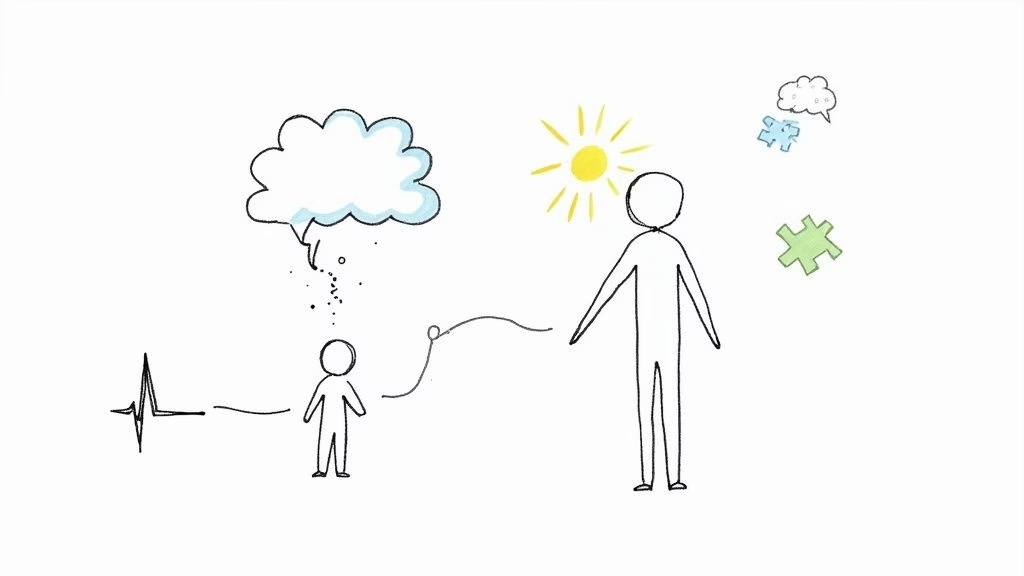Developing critical thinking isn't about memorizing facts for a test. It's about learning to question everything, analyze arguments, and form your own solid conclusions. It's a skill you build by consciously looking at what you see, hear, and read, instead of just taking it at face value.
Why Critical Thinking Is Your Secret Weapon
Let's be real—"critical thinking" sounds like something your teacher would drone on about. But it’s actually a superpower for navigating everything from ridiculous TikTok trends to making huge life decisions.
It’s the skill that helps you figure out which online claims are legit, why a news headline feels a little off, or whether a friend’s excuse actually makes sense. You’re already using it every day, you just might not realize it. Our goal is to make that process intentional, turning it into a tool that builds real confidence and mental strength.
Beyond the Classroom
This isn't just about getting better grades, though that will definitely happen. Learning how to think critically is about taking control of your own thoughts and beliefs.
It gives you the power to:
- Spot Misinformation: Easily call out fake news, biased posts, and manipulative content online.
- Make Better Decisions: Weigh the pros and cons of your choices, from what you're doing this weekend to which college might be the right fit.
- Build Real Confidence: Trust your own judgment because you know how to back it up with solid reasoning.
- Improve Your Relationships: Understand where other people are coming from, communicate more clearly, and handle arguments without all the drama.
The need for this is more urgent than ever. A 2020 survey found that while 94% of people believe critical thinking is crucial, 86% feel most people just don't have these skills. Even crazier, 60% of people said they were never even taught it in school. You can check out the full findings in this critical thinking report.
A quick note for parents: Frame this as an empowerment tool. Critical thinking isn't about challenging you; it's about building the self-awareness and analytical skills your teen needs to navigate a complicated world with confidence. Encourage open dialogue by asking questions like, "What do you think about that?" instead of giving direct answers.
Core Components of Critical Thinking
So, what are we actually trying to build here? Let's break down the essential skills. Think of these as the different tools in your mental toolkit.
Here's a quick look at the core components we'll be working on throughout this guide.
| Thinking Skill | What It Means for You |
|---|---|
| Analysis | Breaking down big ideas or problems into smaller, manageable parts to see how they all connect. |
| Interpretation | Figuring out the real meaning behind information, data, or even what someone is saying. |
| Inference | Drawing logical conclusions based on the evidence you have, even if you don't have the full picture. |
| Evaluation | Judging the credibility and strength of arguments, sources, and claims you see every single day. |
| Explanation | Clearly explaining your own reasoning and how you arrived at a particular conclusion. |
| Self-Regulation | Being aware of your own biases and thinking patterns, and consciously keeping them in check. |
Each of these skills works together to help you think more clearly and independently. Now, let's dive into some practical ways you can start sharpening them in your daily life.
Practical Exercises to Train Your Brain
Theory is great, but building critical thinking skills happens when you actually do something. Think of this part as your mental gym. We're moving past definitions and jumping straight into real-world exercises designed to build your analytical muscles, one rep at a time.
These aren't abstract thought experiments. They're tools you can use right now to make sense of your own life, from procrastination to personal beliefs. A hands-on approach is everything. Research shows that just listening to lectures doesn't do much for critical thinking. It's the active stuff—like debates and case studies—that really sharpens your problem-solving skills.
Uncover Root Causes with the Five Whys
Procrastination is a perfect example of a problem that critical thinking can untangle. Instead of just feeling guilty about putting off an assignment, you can use a technique called the Five Whys to dig deeper and find the real issue.
It’s surprisingly simple: you state the problem and then ask "why?" five times to get to the core.
Let's try it with a classic scenario: putting off a big history paper.
- Problem: I keep procrastinating on my history paper.
- Why? Because I don’t even know where to start.
- Why? Because the topic feels way too big and overwhelming.
- Why? Because I’m worried I’ll pick the wrong argument and won’t find enough good sources.
- Why? Because I’m kind of intimidated by my teacher's expectations for this paper.
- Why? Because I’m really afraid of getting a bad grade and feeling like I failed.
See what happened? The problem isn't just laziness. It’s a fear of failure. That's a much more specific issue you can actually tackle. Instead of staring at a blank page, you can now focus on breaking the project into smaller chunks or talking to your teacher to get clarity on what they're looking for.
Challenge Your Own Beliefs
We all carry around beliefs we’ve never really stopped to question. The Belief Challenge is a powerful journaling exercise that forces you to examine your own assumptions. This isn't about proving yourself wrong; it’s about understanding why you believe what you do in the first place.
Pick one belief you hold—it could be something simple like "I'm just not a math person" or something more complex about politics or relationships. Then, grab a journal and write down your answers to these prompts:
- What is the belief? Write it down, plain and simple.
- Where did I get this belief? Was it from family, friends, something I saw online, or a personal experience?
- What evidence supports this belief? List specific examples or facts that back it up.
- What evidence challenges this belief? Actively look for counter-arguments or times when this belief wasn't true. Be honest.
- What’s a more accurate way to think about this? Try to create a new, more nuanced perspective based on your analysis.
This process helps you shift from automatic thinking to intentional, evidence-based reasoning. It's about seeing the full picture.
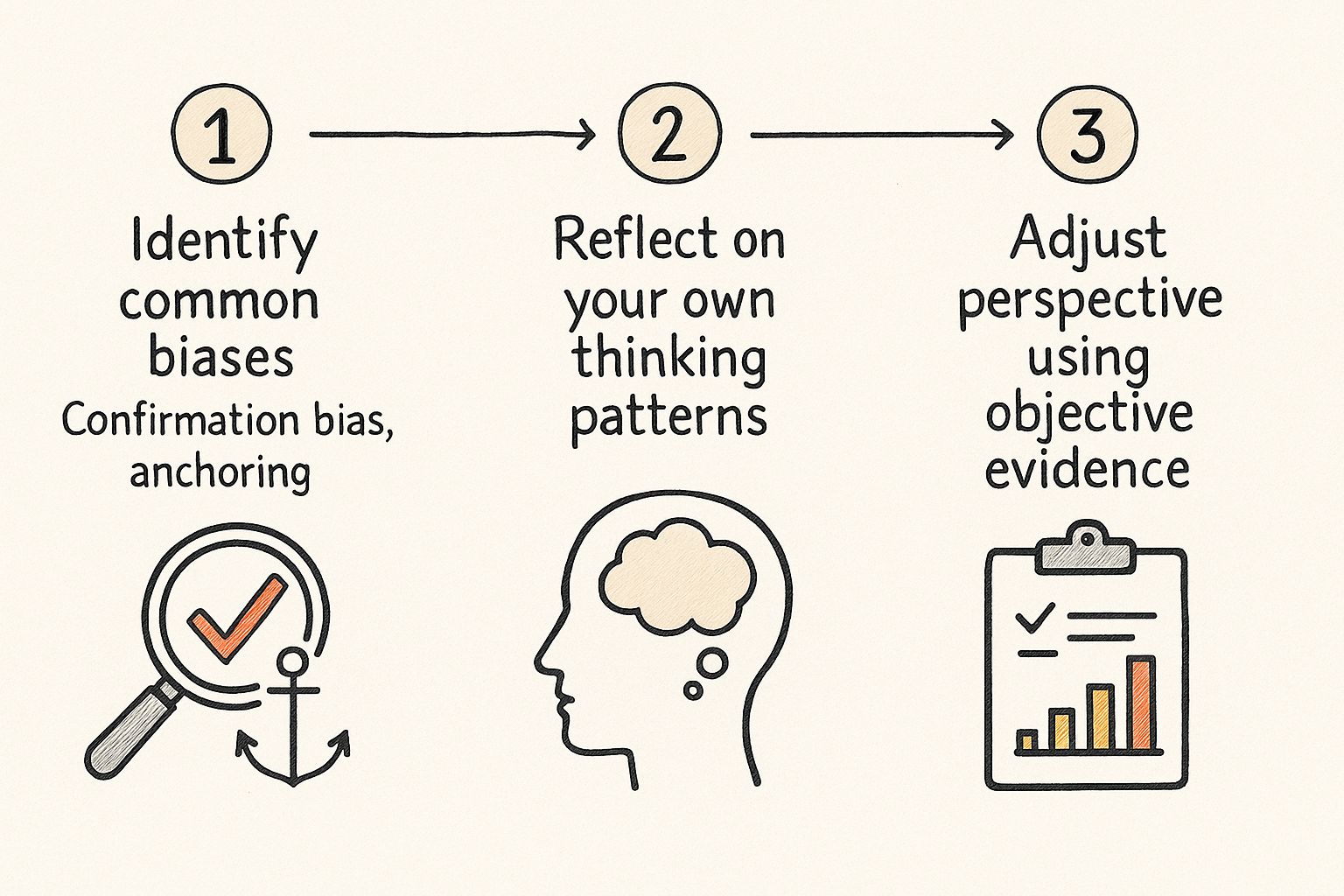
This flow really shows that true critical thinking is an internal gut-check—a process of self-reflection and adjustment, not just about judging what’s happening on the outside.
Your Weekly Critical Thinking Workout
Building these skills is like working out a muscle—consistency is key. You don't need to spend hours a day on it. Just 15 minutes can make a huge difference. Here’s a simple schedule to weave these exercises into your week.
| Day | Activity (15 Minutes) | Skill Focus |
|---|---|---|
| Monday | Pick a news headline. Read two different articles about it from sources with opposing views. | Perspective & Bias |
| Tuesday | Use the Five Whys on a small annoyance from your day (e.g., "Why am I so tired?"). | Root Cause Analysis |
| Wednesday | Watch a 10-minute TED Talk. Pause halfway and predict the conclusion. Then see if you were right. | Logical Prediction |
| Thursday | Do a quick Belief Challenge on a simple assumption, like "I'm bad at public speaking." | Self-Awareness |
| Friday | Think about a recent decision you made. List three alternative choices you could have made. | Decision Analysis |
| Saturday | Explain a complex topic you're learning in school to a friend or family member. | Clarifying & Simplifying |
| Sunday | Spend 15 minutes planning your week. Identify one potential obstacle and brainstorm solutions. | Proactive Problem-Solving |
Stick with this for a few weeks, and you'll start to notice your thinking become sharper and more deliberate, almost without trying.
Overcoming Procrastination with Critical Thinking

We've all been there. Staring at a massive project, feeling that heavy dread settle in. Procrastination isn't just laziness—it's often a complex mental roadblock. It’s the anxiety that whispers, "you'll mess this up," or the total lack of motivation for a task that feels pointless.
Instead of trying to bulldoze through with willpower, what if you could outsmart procrastination? This is where critical thinking comes in. It’s a tool for diagnosing and dismantling the real reasons you’re putting things off.
This isn’t about just forcing yourself to do the work. It’s about looking past the obvious behavior—avoiding homework—and asking smarter questions. Are you stuck because you're scared of not being perfect? Confused about where to even begin? By applying logic to your emotions, you can turn a vague, overwhelming problem into a series of small, solvable challenges.
Deconstructing the Task
One of the biggest drivers of procrastination is feeling overwhelmed. When a project looks like a mountain, our brains naturally want to shut down. The key is to stop seeing it as a mountain and start seeing it as a series of small, manageable steps.
Think like a project manager for your own schoolwork. Grab a project you're avoiding and ask yourself these questions:
- What’s the absolute first, tiniest step? Forget the final product for a second. Is it just opening the textbook? Writing one single thesis sentence? Finding one source?
- What are the main chunks of this project? A research paper isn't one task. It's really several: researching, outlining, drafting, citing sources, and editing. List them out.
- Can I set mini-deadlines for each chunk? This turns a distant, high-pressure due date into a series of achievable, low-stress goals.
This analytical approach shifts you from emotional paralysis to logical action. The goal is no longer "write a 10-page paper." It becomes "spend 20 minutes finding three articles." See how much easier that is to start? These are the kinds of organizational skills tied to your brain's command center; you can learn more by checking out our guide on what is executive functioning.
Critically Evaluating Your Methods
Just because you’re busy doesn’t mean you’re being effective. Not every study method works for every person, and what works for history might not work for math. Instead of blindly following the same old routine, it’s time to think critically about how you work.
Treat your study habits like a science experiment. You observe, test, and adjust.
Ask yourself: Is what I'm doing right now actually getting me closer to my goal, or is it just making me feel busy? Be honest. This is how you break the cycle of wasted effort.
Let's say you spend hours rereading your textbook chapters but still bomb the quiz. The easy conclusion is, "I'm just bad at this subject." But a critical thinker would dig deeper and analyze the strategy itself.
Was rereading a passive activity? Almost certainly. What if you tried something active instead, like making flashcards, trying to explain the concepts to a friend, or running through practice problems? By evaluating the why behind your results, you can pivot to strategies that actually work.
A Guide for Parents Fostering Motivation
As a parent, your instinct might be to push, but the goal here is to coach, not command. You want to help your teen build their own problem-solving muscles so they can manage this on their own.
Here are a few ways to guide them:
- Ask Analytical Questions. Instead of, "Have you started your homework?" try, "What's your game plan for that project?" or "Which part feels like the biggest hurdle right now?" These questions get them thinking strategically.
- Connect Schoolwork to Their World. Help them find a personal hook. If they love video games, maybe that history paper can be about the historical accuracy of their favorite game. A personal "why" is a powerful motivator.
- Celebrate the Process, Not Just the Grade. Acknowledge the effort. Did they break a big project down? Did they try a new study method? Praising the skills reduces the fear of failure and reinforces the habits that lead to success.
This kind of support helps shift their view of school from a list of chores to a place where they're building real-world skills. And that’s crucial, because our education system doesn’t always get the job done.
The Connection Between Mental Health and Clear Thinking
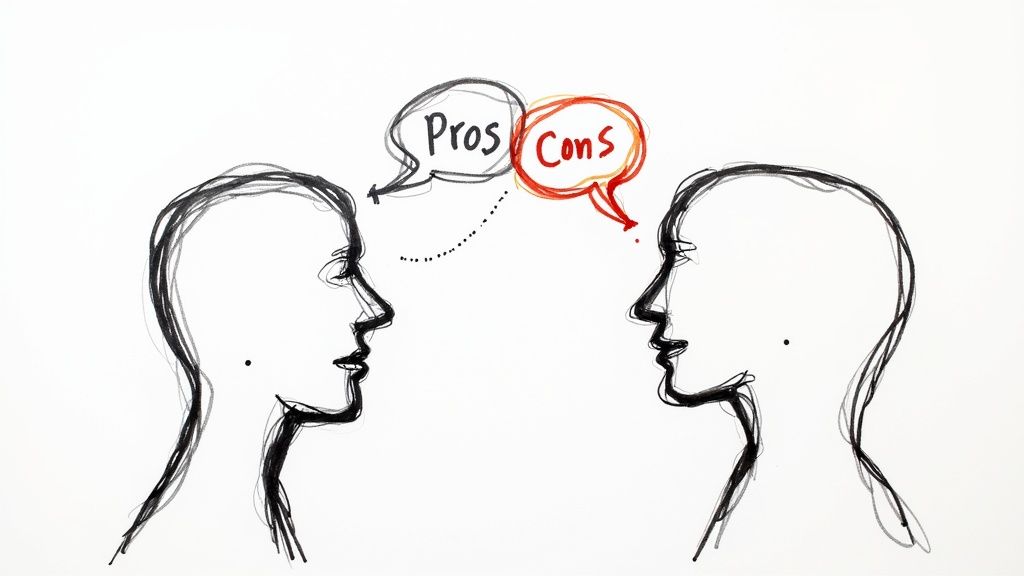
You can't build a strong house on a shaky foundation. In the same way, it's almost impossible to think clearly when your mental health is struggling. Trying to analyze an argument or solve a tough problem when your mind is full of anxiety, stress, or self-doubt is like trying to see through a fog.
Think of it this way: when you feel anxious, your brain's threat-detection system kicks into high gear. This "fight-or-flight" response is great if you're escaping real danger, but it hijacks the parts of your brain you need for calm, logical thought. That mental static makes it hard to see a situation for what it is, weigh evidence fairly, or make a rational call.
Looking after your mental wellness isn't a separate task from learning how to develop critical thinking—it’s the essential first step. When your mind is clear, you create the mental space you need to actually do the work of deep analysis and self-reflection.
Challenging Your Inner Critic
Often, the biggest obstacle to clear thinking isn't some external debate but our own internal monologue. We all have those automatic, unhelpful thoughts, which therapists call cognitive distortions. They’re basically critical thinking errors we apply to ourselves and our lives.
Ever gotten one bad grade and immediately thought, "I'm a total failure and will never get into college"? That's a classic cognitive distortion called catastrophizing. You've grabbed one piece of negative evidence and jumped to the absolute worst conclusion, ignoring all other factors.
Cognitive Behavioral Therapy (CBT) gives you a powerful way to fight back. The core idea is simple: treat your own thoughts like any other claim. Question them. Look for evidence. Consider other, more likely explanations. Professional approaches like cognitive therapies offer structured methods to strengthen the mental hardware needed for critical thinking.
By learning to spot and reframe these distorted thoughts, you're not just improving your mental health; you're actively practicing critical thinking on the battlefield of your own mind.
A Simple Meditation Guide for Teens
One of the best ways to quiet all that mental noise is meditation. This isn't about emptying your mind completely—that's a myth. It's about learning to watch your thoughts come and go without getting swept away by them. Just a few minutes a day can build the focus you need for a clearer head.
Here’s a simple way to get started:
- Find a Quiet Spot: Sit somewhere comfortable, either in a chair or on the floor. You don't need a special cushion or posture, just try to keep your back straight so you can breathe easily.
- Set a Timer: Start small. Just three to five minutes. This makes it feel doable and helps you build a consistent habit without pressure.
- Focus on Your Breath: Close your eyes and just bring your attention to the feeling of your breath. Notice the air coming into your nose, filling your lungs, and then leaving your body. Don't try to change it. Just observe.
- Acknowledge Distractions: Your mind will wander. That's what minds do. You'll start thinking about homework, a conversation with a friend, or what's for dinner. It's completely normal. When you notice your mind has drifted, just gently guide your focus back to your breath. No judgment needed.
Every single time you bring your attention back to your breath, you're strengthening your brain's "focus muscle." This practice builds the mental stamina you need for sustained, critical thought.
Resources for Support
Navigating mental health is a journey, and you absolutely don't have to do it alone. There are some fantastic, credible resources out there designed specifically for teens.
- The Jed Foundation: Offers guides and resources on mental health, getting ready for life after high school, and learning the signs that you or a friend might need help.
- Active Minds: A leading organization for young adult mental health awareness. They have chapters in many schools and offer ways to get involved and find support.
- Teen Line: A confidential hotline where you can talk to other trained teens about whatever is on your mind. It’s a space where you’re understood by your peers.
For young men who are struggling, organizations like The Man Cave and Next Gen Men create safe spaces to talk about the unique pressures they face, promoting healthy masculinity and emotional intelligence.
And don't forget, what we eat directly impacts how we think. Understanding how excessive sugar intake can lead to brain fog and hinder clear thinking is another key piece of the mental wellness puzzle.
A Parenting Tip for Fostering Resilience
Parents can play a huge role here by modeling healthy emotional expression and framing self-care as a strength, not a weakness.
Instead of asking, "Why are you so stressed about this test?" try a different approach: "It sounds like this test is causing a lot of stress. What’s one small thing we can do right now to make it feel more manageable?"
This simple shift validates their feelings and turns the focus toward collaborative, critical problem-solving—a skill that lasts a lifetime.
A Guide for Young Men on Building Resilience

For teen boys and young men, growing up comes with a unique set of pressures. Society often hands you an unspoken rulebook that says strength means never showing vulnerability, and that dealing with your emotions is a silent, solo mission.
But here’s the thing: true strength—and sharp critical thinking—is built on a foundation of self-awareness and emotional honesty.
This is where you need to apply some critical thought. Ask yourself, "Do these expectations actually make any sense for me? Who really benefits if I stay quiet about my struggles?" Using this lens lets you reject a narrow, pre-packaged definition of masculinity. Instead, you get to build an identity based on your own values, your own resilience, and your own authentic self.
This process isn't just about feeling better; it’s about thinking better. Emotional intelligence isn't some "soft skill." It's the bedrock of clear-headed decision-making and the resilience you need to handle whatever life throws your way.
The Power of Positive Mentorship
Navigating all these pressures is a lot easier when you have positive role models in your corner. A mentor doesn't have to be some formal arrangement; it can be a coach, a teacher, an older cousin, or a community leader you respect.
The goal is to connect with men who show their strength through character, kindness, and emotional honesty—not just bravado.
Critically thinking about who you look up to is a powerful act. It’s a conscious choice to learn from men who build others up, communicate openly, and define success on their own terms.
Good mentorship gives you a safe space to ask tough questions and get honest feedback. This is vital, especially when you're dealing with the kind of internal battles so many young men face alone. Recognizing the silent struggles of young men today and how coaching can help is the first step toward building a support system that actually makes you stronger.
Curated Resources for Teen Boys and Young Men
Finding community is crucial. You're not in this alone. Fortunately, there are some excellent organizations and resources out there dedicated to promoting healthy masculinity and creating spaces for real, open conversation.
- Men's Groups: Organizations like EVRYMAN and The ManKind Project offer programs and groups focused on helping men connect with their emotions and each other in a healthy, supportive way.
- Mental Health Support for Men: Resources like HeadsUpGuys provide practical information and support specifically for men dealing with depression, which is a significant but often unaddressed issue.
- Mentorship Programs: Look into local or national mentorship programs that connect young men with positive role models who can provide guidance and support.
Tapping into these resources isn't a sign of weakness; they are tools for building strength. Using them is an act of taking control of your own growth and mental well-being.
A Parent's Guide to Starting the Conversation
For parents, opening up these conversations with your son can feel tricky, but it’s one of the most important things you can do. The goal is to create a judgment-free zone where he feels safe enough to be vulnerable.
Here are a few ways to get the ball rolling:
- "I was thinking about the pressures guys face today. Does it ever feel like you're expected to act a certain way, even if it doesn't feel right?"
- "Who are some men you look up to, whether they're people we know or public figures? What is it about them that you admire?"
- "I want you to know that it's always okay to talk about what's on your mind, even if it feels tough or overwhelming. Your mental health is a priority."
By fostering this kind of open dialogue, you help your son develop the critical thinking skills to define his own values and build the authentic resilience he needs to thrive.
Your Top Questions About Critical Thinking
As you start flexing your critical thinking muscles, you're bound to have some questions. It's totally normal. Let's tackle some of the most common ones I hear from teens and parents, building on everything we’ve already covered.
How Can I Practice Critical Thinking Every Day?
The trick is to weave it into your life, not treat it like homework. You don’t need to block out an hour for deep philosophical debate. Instead, find small, everyday moments to be a little more intentional.
One of the easiest places to start is with your daily information diet.
- When you're scrolling social media: Don't just mindlessly react. Pause for a second and ask, "What's the real goal of this post? Is it trying to inform me, persuade me, sell me something, or just make me mad?"
- While watching a movie or TV show: Get inside the characters' heads. Ask yourself, "Why did they do that? What were their other options, and what would've happened if they chose differently?"
- Anytime you have a strong opinion: Stop and ask, "What's the single best argument against my own view?" Seriously, actively looking for the counter-argument is one of the most powerful exercises you can do.
These little check-ins train your brain to shift from being a passive consumer to an active analyst. It becomes a habit over time.
What's the Biggest Mistake People Make?
Hands down, the most common trap is confirmation bias. We're all wired for it. It’s our brain's natural tendency to seek out, believe, and remember information that proves what we already think is true.
Think of it like wearing special glasses that only let you see the evidence that backs you up. It feels good, right? It's validating. But it’s also the single biggest roadblock to clear, objective thinking. It stops you from seeing the whole picture and can lead to bad decisions, stubbornness, and an inability to understand where other people are coming from.
Want to fight confirmation bias? Turn it into a game. The next time you're researching something you have an opinion on, spend the first 10 minutes deliberately trying to prove yourself wrong. This simple switch forces you to engage with different ideas and makes your own understanding stronger, whether you end up changing your mind or not.
Can Critical Thinking Really Help with Social Anxiety?
Absolutely. A huge part of social anxiety comes from negative thought patterns—psychologists call them cognitive distortions—that run wild without ever being challenged. You walk into a room and your brain immediately jumps to, "Everyone here is judging me," without a single shred of actual evidence.
Critical thinking is the perfect tool for fact-checking those anxious thoughts.
You can use it to question that inner voice:
- Challenge the evidence: "What actual proof do I have that people are judging me? Are they even looking at me, or are they wrapped up in their own conversations?"
- Look for other explanations: "Maybe they’re not judging me at all. Maybe they're just focused on what they're doing. Maybe that person who looks serious is just tired or had a rough day."
- Assess the real stakes: "Okay, even if someone did have a negative thought about me, what would actually happen? Will I even remember it tomorrow?"
By running through this logical process, you can start to dismantle those anxious thoughts before they spiral out of control. It gives you the power to separate what you're feeling from what's actually happening. This practice builds real confidence by proving to yourself that your thoughts are just thoughts, not undeniable facts.
Are you ready to stop feeling overwhelmed and start taking control of your future? At Andrew Petrillo Life Coaching, we help teens and young adults build the skills they need to succeed—from conquering procrastination to building unstoppable confidence. Learn more about our personalized coaching and book your complimentary discovery call.















